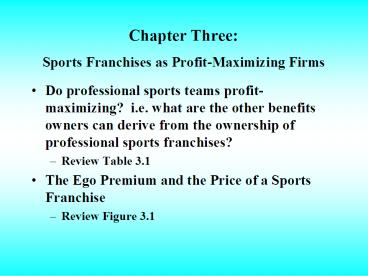Chapter Three: Sports Franchises as ProfitMaximizing Firms - PowerPoint PPT Presentation
1 / 6
Title:
Chapter Three: Sports Franchises as ProfitMaximizing Firms
Description:
Do professional sports teams profit-maximizing? i.e. what are the other benefits owners can ... Example: Atlanta Braves and TBA. Large administrative costs ... – PowerPoint PPT presentation
Number of Views:123
Avg rating:3.0/5.0
Title: Chapter Three: Sports Franchises as ProfitMaximizing Firms
1
Chapter Three Sports Franchises as
Profit-Maximizing Firms
- Do professional sports teams profit-maximizing?
i.e. what are the other benefits owners can
derive from the ownership of professional sports
franchises? - Review Table 3.1
- The Ego Premium and the Price of a Sports
Franchise - Review Figure 3.1
2
Profits, Revenues, and Costs
- Profits Total Revenue Total Costs
- Revenue Streams
- Gate receipts
- Television revenues
- Stadium revenues
- Licensing income
- Costs
- Player salaries are the primary fixed costs.
- Travel
- Marketing
- Administrative
- Venue expenses
- Player development NHL and MLB
- Andrew Zimbalist estimates that development cost
in MLB is 5 million per year, or 1 million per
player.
3
Turning Profits into Losses
- Vertical integration
- Example Atlanta Braves and TBA
- Large administrative costs
- Example The OMalleys of the LA Dodgers paying
themselves a salary. - Depreciation of players The Veeck Loophole
4
The Importance of Leagues
- Setting the rules (What is the purpose of the
rules?) - To enhance the enjoyment of fans.
- How? Limit injuries to star attractions.
- Promote competitive balance.
- Note Any strategy that provides a permanent
advantage will be outlawed
- i.e. The three second rule in basketball.
- In the long-run, competitive differences are a
function of talent alone. - Limiting entry
- Entry is limited to maintain the monopoly power
of existing franchises. - If entry is too limited, though, rival leagues
can form. However, as we will see, rival leagues
are typically doomed to failure. - Competitive balance and revenue sharing
- We will discuss competitive balance in depth
after chapter three. - Marketing
- Public goods and the free rider effect.
5
Neal, Walter. The Peculiar Economics of
Professional Sports Quarterly Journal of
Economics 78 (February, 1964) 1-14.
- Louis-Schmelling paradox
- The inverted joint product or the product joint
- Joint product - two products technologically
resulting from a single process. - Product joint - An indivisible product from the
separate processes of two or more firms. - Professional baseball produces several
interrelated streams of utility - In-person viewing of the game
- Broadcasts of games
- League standing effect
- Fourth Estate Benefit
- Conclusion The several joint products which are
products joint of legally separate business firms
are really the complex joint products of one
firm, and this firm is necessarily an
all-embracing firm or natural monopoly.
6
Neale (1964), cont.
- Four possible cases of interleague competition
- Major League Baseball solution the joining of
two leagues into one monopoly. - The professional football solution of the 1940s
The bankruptcy of one league. - Survival of two or more leagues that are not
economically competitive due to geographic
distances or the institutions of sport and
culture. - Survival of two or more leagues that are
economically competitive and which could be
sportingly competitive. - The second case is the most common solution.
Geographic distances and culture institutions
seem to be overcome overtime (exception CFL and
Japanese baseball). - In general, additional leagues bid up costs and
reduce revenues, hence reducing the profitability
of each league.






























